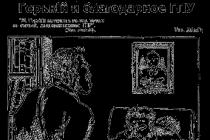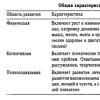Alexander Genis: American Slavic studies are sensitive to political changes. As the director of the Russian School in Vermont told me last summer, “as soon as Putin opens his mouth, we have five new students.” And they all have to master one of the most difficult languages in the world. Russian language teachers at American universities tell our correspondent Vladimir Abarinov how this happens.
Vladimir Abarinov: Learning a foreign language means understanding the lifestyle and logic of its native speakers. It's not easy when there is a cultural barrier. The teacher has to explain things that seem obvious to him and which he himself has never thought about. I talked about this with three of my friends who teach Russian language and literature to American students.
One of them is Yulia Trubikhina. She teaches at New York's Hunter College. To begin with, I asked her what kind of people her students were and why they needed the Russian language.
They sign up for Russian courses for various reasons. In New York we have a huge Russian population. That is, some are children from Russian-speaking families. Some of them go to language courses because they need some foreign language anyway, and at first many of them hope for an easy grade. This almost never works out. American non-Russian-speaking students choose Russian... well, I don’t know why. Maybe because they always wanted to, maybe because it was interesting, maybe they read something in the news, maybe because they were Russian friends or a Russian girl or young man. They still need to take some foreign language. But for those who sign up for literary and cultural courses, things happen differently to them. An interest in culture or literature may arise while you are studying the language. It depends on the teacher. If they like the teacher, then they go to literature and culture. And some people are really into it. So there are very different motivations here.
Vladimir Abarinov: Diana Gratigny began teaching Russian to foreigners in her native Saratov. She currently teaches at Mercer University in Macon, Georgia. The question is the same: what are its students like, what explains their interest in the Russian language?
This is always a very interesting question, and I have asked myself it many times: why do they learn a language? Interest and motivation can be anything. But what happens to them in the process of learning the language and understanding the culture is the most interesting thing. All of them are clearly divided into two poles: those who do not accept the culture also experience difficulties in learning the language. Often there is a psychological background here - not some kind of linguistic impediment of our own, but psychological difficulties. And there are those who fall in love from the first moment, and no matter what happens to them in Russia, they really like everything. Of course, something happens to everyone, they all find themselves in extreme situations, but this is where their character is tested. One way or another, many are the majority! - have a keen interest in the subject.
Vladimir Abarinov: Elena Reznikova, a teacher at Union College in Schenectady in upstate New York, answers the same question.
Elena Reznikova: What motivates them? Well, in principle, many of them study either political science, ecology, or international relations, so the Russian language is relevant and interesting for them. Some come to study Russian because their grandparents or more distant ancestors were from Russia. Some people are simply interested in Russian culture, the Russian language.
Vladimir Abarinov: The problems start with grammar.
Elena Reznikova: Well, of course, the very first thing that strikes students is grammar. Students in general are not prepared for this level. If they had studied Latin or even just serious English grammar in high school, then, of course, they would be ready for this. But when they have to comprehend all the intricacies of cases, declensions and conjugations, they begin to panic a little. After that lesson, when all the secrets of the genitive case were revealed to them, all these many forms, they moaned for a whole week. And, of course, as soon as the cases ended, the perfect and imperfect forms began.
Vladimir Abarinov: But in English there are also perfect and imperfect forms of the verb.
Elena Reznikova: Yes Yes Yes! They were quite surprised when they learned that there are equivalents in English. When I told them: do you know, for example, that in English there is a present perfect? They said: what are you talking about? Give an example.
Vladimir Abarinov: Diana Gratigny understood what culture shock was back in Saratov.
The first thing that comes to my mind at the moment is the story of a student from New York. It was an African-American woman. She came to Russia 10 years ago and encountered racism. But what kind of racism? People paid attention to her. She was studying in Saratov then, and in a provincial city, even a big one, people paid attention to her appearance, she was very pretty and, apparently, in the cafe where they were relaxing, some comments were made, apparently a word forbidden in the USA the letter “n” was pronounced, and she suffered greatly about this. She couldn't handle it. Very often with students, not only from America, we have to explain in class... We put all our materials aside and explain why people don’t smile, or smile, but not as they should, or in the wrong place, or, conversely - why are they puzzled by your smiles...
Vladimir Abarinov: Well, there are comical cases.
I had an American Mennonite family. Mom and dad studied Russian, and they had three adorable kids. And so they lived in Russia, because there are Mennonites in Russia too, they have a parish, and the father is a priest there. But I was interested: what exactly did they show the children when they arrived in Russia? They went to Moscow, as always, to Red Square and showed the children Lenin’s mausoleum; they were in the mausoleum. And they went to the cosmonautics museum and showed all these, you know, spaceships, devices, Gagarin and so on. In my opinion, a very strange choice for Mennonites. It seems to me that the parents remembered something from their childhood and wanted to see it for themselves. So here it is. When mom and dad came to me to study Russian, my daughter entertained the children. She was then 10 years old, and she had a richly illustrated book called “Russian History”. And there, in a popular way with many pictures, the whole Russian history was told for children up to the 60s of the 20th century. And there were Soviet posters dedicated to space. And before that there were posters dedicated to Lenin, the revolution, and so on. And after one lesson, the eldest boy, he was about seven years old, came up to his parents and said: “We were just watching Russian history. Do you know that Gagarin flew into space and reached God himself?” There was a pause. My parents looked at me, I looked at my parents. My child, of course, did not say anything like that, that is, it was the boy’s own conclusion. The parents tried to open their mouths and explain that they probably hadn’t seen it after all, but then the youngest, who was four years old, entered the conversation and he declared very solemnly: “And God was Lenin!”
Vladimir Abarinov: And here is what Yulia Trubikhina says about her students.

Both the strength of American students and their weakness is that they do not have a cultural context. This is a big problem. It feels like there is no overall context left. Previously, at the very least, mass culture provided at least some general context. It turned out that with the increase in the number of foreign students there is nothing in common at all; you’re afraid to joke – they won’t understand. And the amazing equality is absolutely wonderful, the absence of hierarchy. I remember how, in a course on Russian culture, one girl cheerfully began an essay on Habakkuk (and this, of course, is incredibly difficult, we read some fragments from Habakkuk) in this way: “As we say in Oklahoma...”
Vladimir Abarinov: When reading literature, students first of all encounter unfamiliar realities.
Elena Reznikova: For example, we read Bulgakov. What concerned all this phantasmagoric reality of Moscow in the 30s was very difficult to understand. The housing issue, all these communal apartments – I had to explain for a very long time. This whole currency situation...
Vladimir Abarinov: But it is much more difficult to comprehend the way of thinking and the logic of the characters’ actions.
Elena Reznikova: It was very difficult for students to read Crime and Punishment. Dostoevsky himself torments the soul even of Russian readers, and such sheltered American teenagers, of course, have nothing to say. It was very difficult for them to understand all the suffering, all these tossing and turning of the main character and the entire galaxy of characters. Katerina Ivanovna, in my opinion, tormented everyone with her costumed children, dinner parties and so on. Students asked many questions: why do they do all this? Why do they behave this way?
Vladimir Abarinov: Understanding poetry is generally a problem.
One boy - this was Tsvetaeva’s “Attempt of Jealousy”... And so it is very difficult for them, and he completely does not notice the quotation marks interpolating the line “I’ll rent a house for myself,” and suggests that maybe Tsvetaeva wanted too much money from lover It's home. She was too expensive for her lover - so he didn’t want to get involved with her. Probably so.
Vladimir Abarinov: Another great example of cultural differences.
We had a Korean student. She studied Russian at the Literary Institute for several years, then went to Korea and became a translator. And she translated Russian fairy tales, in particular “Teremok,” into Korean. The fairy tale was published, and she brought it as a gift. And then we set up an experiment. We gave our Korean students this fairy tale in Korean and asked them to translate it into Russian. Here it is very interesting to see how different cultural codes work. For example, in our fairy tale, the mouse ran across the field without any reason, it just ran. They are all running: a frog, a bunny - there is nothing to do. But in the Korean translation, they all ran for some purpose. The mouse was looking for grains, the frog was looking for juicy grass, someone was looking for something else - they all had a goal. That is, in Korean culture, no one can just run somewhere, there must be a goal. Further: when the bunny knocked on their door, that is, there were already two animals in the little house, and to the request “Let me live with you,” they always answered the same thing: “Now we’ll consult.” And they began to consult about whether they could let the next beast in or not. And when it came to the bear, the animals separated. Strong animals - a wolf, a fox - said: “The bear is big, he will crush us.” Because they knew. And the small animals believed that he would protect them. And since there were more of them, the mouse, the bunny and the frog won the vote and let the bear in, and then what happened happened. Of course, we are facing a completely different fairy tale. Adapted for understanding by Koreans.
Vladimir Abarinov: I wonder if it happens that students force the teacher to see the situation from a new, unexpected angle?
Elena Reznikova: It seems to me that what foreigners notice is most likely the absurdity of what is described in a literary work. There are a lot of situations, some idiosyncretistic characteristics of the characters, some completely crazy, absurd ones that don’t make any sense in a normal, sane situation. That is, very often they contradict common sense. This can be clearly seen in the example of Petrushevskaya’s prose - her heroes.
Vladimir Abarinov: Yulia Trubikhina believes that traditional teaching methods do not work with modern students.
In general, modern students are simply different. They generally read little, but they are absolutely visual. They find it difficult to focus on one thing for long. Therefore, the educational process turns out like television, with commercial breaks - you have to sing or dance before them. Figuratively speaking.
Vladimir Abarinov: And Diana Gratigny believes that all this torment is not in vain.
And this is the cross of the Russian language. And Russian literature, and Russia. They draw you in so much and suck you into themselves... It seems: oh well, I stayed here, left and that’s it. But no. Here he takes you by the heart and holds you. And then they start rushing about: we want to come - and they come, and read, and read, and become translators, researchers. And it all starts with something completely innocent: I didn’t know anything, I decided to try.
ABARINOV
With us were teachers of Russian language and literature in American colleges Elena Reznikova, Yulia Trubikhina and Diana Gratigny.
If you are looking for a regular high school where most teenagers study Russian, look not in New York or Alaska or some other area with a concentration of immigrants from this country.
No, go to class 213 at the Robert Goddard French Immersion School in Prince George's County, Maryland; today, for example, a rag doll “Aunt Motya” is jumping on the teacher’s lap. Dani Sanders sings a humorous song about the doll's misfortunes; The doll's four sons at the dinner table keep repeating:
“Right hand, left hand; right shoulder, left shoulder,” each time moving the named part of the body.
“Ah, ah, ah!” In this phrase, the English translation and the Russian original sound the same.
In 2010, according to a report by the Commission on Collegiate and Pre-Collegiate Russian Language Education, which tracked Russian language class enrollment since 1984, Sanders had 176 students studying Russian in eight classes. The Goddard School, the only one in this region, offers classes in a comprehensive Russian language teaching program. Of the nearly three hundred schools across all grade levels that provided data, Goddard has the most comprehensive secondary education program in the country.
Often the largest Russian language classes are attended by children who continue the cultural tradition of their parents. But not Goddard. In this school, 82% of the students are African-American or Hispanic-American - in class number 213 there is not a single student of Russian origin. Even Sanders herself is from Bulgaria.
In her classroom, 33 Cyrillic letters are pinned to the board with pins. On another board are cards with numbers that Sanders drew with a thick marker. Only the homework assignment - “repeat numbers from 1 to 100” - is written in English: so that parents can help their children with their homework.
“It’s easier to learn a language if you study at home and memorize the words,” says David Williams, 12, a seventh-grader. - I think so, the more languages I can speak, the more opportunities I will have to change the world. And all I want to do is change the world."
Unusual hobby
Interest in the Russian language is indeed unusual. According to a 2008 report by the American Council on the Teaching of Foreign Languages, only 10% of high school students surveyed would choose to study Russian if they had the opportunity.
The most popular foreign language - almost 40% of respondents said they wanted to learn it - was French.
At the Goddard School, founded in 1986, which provides primary and secondary education, students learn both languages. Children are admitted to this school, according to a certain procedure, while still in kindergarten. Teaching here is conducted only in French, with the exception of two courses: English and world languages.
Initially, the school used the world languages course to introduce children to the richness and diversity of non-traditional languages such as Japanese and Swahili.
But then, ten years later, says director Kona-Facia Nepay, management decided that students should study one language intensively. According to a survey of parents, Nepey says, 85% wanted their children to study Russian.
Russian? At first glance, the choice is strange. The Cold War is over. Russian language programs across the country have been cut, and some teachers believed Russian language instruction would be frozen nationwide. But in Prince George's, the language finds itself in a unique position.
"Parents thought it would help their children get into Roosevelt," Nepey said.
Eleanor Roosevelt High School, the area's most renowned and highly selective high school, was the only other school in Prince George's to offer Russian language instruction at the time. Parents of students at the Goddard school, according to the school administration, hoped to make it easier for their children to enter this school by knowing the Russian language. And often their expectations were justified.
Following instructions
This practice of admission benefits for children who speak Russian came to an end five years ago, say school staff. However, the Russian language has meanwhile become firmly entrenched in the cultural environment of the Roosevelt School, despite the fact that Chinese and Arabic, for example, are now as important as Russian was before the collapse of the Soviet Union.
Despite everything, after years of declining interest in the Russian language, many foreign language schools have reinstated—and even strengthened—their Russian language courses in recent years, says John Schillinger, a professor emeritus at an American university. collecting survey materials about enrollment in training courses.
The most extensive programs exist in high schools, where student numbers typically grow due to the popularity of the Russian language teacher, Schillinger says. Before high school, the language is usually taught in the form of an introductory course. The Russian language program at the Goddard School differs in scope and seriousness of approach.
"It's not just 'give them something to do for twenty minutes a day,'" says Schillinger. “They learn from university-level textbooks, which means this is a rich, intensive program.”
Make learning fun
In Sanders' class, this rich curriculum is implemented through play.
Sanders points at one number after another on the board as fast as he can, and the students repeat them at lightning speed. When learning colors, students bring sets of colored pencils with them. They use dolls. They watch cartoons.
They sing songs about Aunt Mota, who is nervous that her children do not want to eat.
“Right foot, left foot,” the students sing.
Sanders hopes that by the end of school they will be able to speak Russian fluently and master the basics of writing.
“I want to be able to go to Russia, I like Russian architecture,” shares thirteen-year-old seventh grader, Ava McNabb. - This course is very fun. We learn a lot of words and expressions, and now we are starting to learn to actively use them all together in speech.”
In traditionally university Irkutsk, foreign students are not uncommon. In almost every group of every university or institute there are a couple of foreigners who, for various reasons, decided to get an education in Russia and chose a Siberian city for this. Students from the USA told The Village why Irkutsk is better than St. Petersburg, what is the most important word for Russians, and why there are dumplings for breakfast.
Faina
State of Indiana
The roads in Indiana are worse than in Irkutsk. It's not so bad here, there's asphalt everywhere
I knew practically nothing about Russia before I came here. Like many in America. There are people who still think that there is communism in Russia. The only thing I was familiar with was Russian culture. I listened to classical Russian music a lot. I wanted to know Russian so I could understand songs and sing them. I really like Rachmaninov. And my favorite Russian song is “Fly away on the wings of the wind.”
I love Russian literature. Especially Gogol and Dostoevsky. Russian literature is more complex and psychological. And also, in general, probably darker. But it is different from just sad books in America. When Americans write something dark, it's just sad. Sadness for the sake of sadness. In Russia it makes sense. I love dark literature. With its help we can see the best parts of people and humanity.
I have been in Irkutsk for 2 months already. I came here because I am writing a report on Siberian literature for my university. I study the works of Vampilov, Tarkovsky and Rasputin. In addition, when I lived in St. Petersburg, there was too much communication in English. American students know that in St. Petersburg and Moscow there is always a party. It's difficult to study seriously there. In the end, I liked Irkutsk more than St. Petersburg. People in Irkutsk are more open, but not as open as in my state. In Indiana, strangers talk to each other on the street, and it seems completely normal.
Russian language is very difficult. When I started learning Russian, I spent 10 minutes saying the word “hello.” And then another 10 minutes to say “Tatiana.” Words in Russian are very long. For example, sights and mutual understanding. Very hard.
The roads in Indiana are, frankly, worse than in Irkutsk. It's not so bad here, there is asphalt everywhere. I love that Russia has a transport system. Buses don't run often in Indiana. Sometimes people wait two hours for the bus.
Isaac
State of Vermont

The landlady often calls me to the TV with the words: “Look what your Trump is doing!”
I live in Vermont, in a small suburb, on a farm. I've been in Russia for a month and a half now. Before that, I studied Russian for four years, but not seriously, always together with other languages. In addition to Russian, I studied Chinese, Arabic and French at school. The most difficult is probably Russian.
I started learning Russian when I was a freshman. I listened to Russian music a lot and so I decided to try it. I have been interested in Russian music since childhood. I listened to a lot of Leningrad, although I didn’t understand a word. Dad showed it to me. He is a musician and has his own small band. Once he even wanted to translate the songs of “Leningrad”. Together with his friend who knew Russian. However, only one song was translated. Before that, I didn’t even know what the Leningrad songs were about. It was funny. Then I listened to “Civil Defense” and Russian rap.
When I started studying Russian at university, I myself tried to translate Russian songs or poems. I translated for my friends and girlfriend. They love poetry. Especially Russian. We do not have such literature as in Russia. There are no major poets or writers. One Russian asked me who our main writers are, the real ones. I couldn't name it. We don't have Pushkin.
In Irkutsk, I rent a room from an elderly woman, so I can immerse myself in Russian culture. Eating traditional food and seeing how ordinary people live in Russia. Watch Russian TV. On the very first day, the hostess said that we would not talk about politics, but after an hour she could not stand it. She often calls me to the TV with the words: “Look what your Trump is doing!”
There are many difficulties in Russia. For example, it’s not easy for me to cross the road. In America there is a concept that if a car doesn’t slow down before crossing, it means it won’t stop. You have to wait until they let you through. Fortunately, you don't have to wait long. There is no point in waiting in Russia. To cross the road, you have to try. You just have to go and then they will let you through. This seems like a pretty dangerous undertaking.
Lance
State of Pennsylvania

I've been in Irkutsk for less than two months and have already eaten dumplings more than forty times
I have been living in Irkutsk for two months now. I’ve been studying Russian for several years, since my first year at university. I chose Russian because Russia is an important country. Every day I read something about Russia in the news. By studying Russian, I can learn about Russia on my own. This is very important because I can create my own opinion.
Everyone I've met here is very kind. Everyone is interested that I am from America. They often ask: “Oh, you’re from America, right? Why Irkutsk? This is the main question for them. Irkutsk is a very good city, very beautiful, in my opinion. In general, this is my second time in Russia. I lived in St. Petersburg for 5 weeks, and was in Moscow and Novgorod. This time I wanted to see a different part of Russia, so I chose Siberia. Siberia is very far from what I have seen before. It's a different world here. In Siberia, people are kind, because life seems to be not so fast. In Moscow and St. Petersburg, people always need to go somewhere, do something. Here, apart from the minibus, life in general is slower.
The Russian language is very different from English. It seems to have more synonyms, for example, for the word "die". I saw 30! This is amazing. “Die”, “perish”, “move your horses”, “play the box”, “die”. They say that the more important a concept is for a country, the more other names it has. But Russian, in principle, is a very rich language.
From Russia I will bring a pack of Belomorkanal and Armenian cognac. I would like to take real Russian food, but there are many restrictions at customs. I have one favorite dish from Russia - dumplings. I have been in Irkutsk for less than two months and have already eaten dumplings more than forty times. Sometimes I eat dumplings for breakfast. I also really love poses and fat. We don't have all this, unfortunately.
There are many myths about Russia. Many people in America think that everyone in Russia wants to defeat the United States. But I have not yet met anyone in Russia who would like more than just to go to America and see New York, San Francisco. I have yet to meet anyone who is angry that I am American. Everyone is just interested in learning something about America. There are many myths about nasty Russian or American societies. But I think we are all the same. People are like people.
Text and photos: Anna Teresa
Kalinka meets us. When she first started studying Russian, the teacher looked at her sternly and said: “What is your name? Kalin? No, you will be Kalinka.” Now Kalin is a graduate student and herself teaches first-year Russian at the oldest Russian summer school in the USA - at Middlebury College, Vermont, where we came to attend his lectures.
This school, which was opened after World War II in 1946, graduated from the current US Ambassador to Moscow John Beyrle, many diplomats, as well as CIA and FBI agents. In addition to Russian, Arabic, Chinese, French, German, Hebrew, Italian, Japanese, Portuguese and Spanish are taught here. On the third day of their summer courses, all students take an oath: “By entering the Language School, I undertake to comply with the School Charter and use the school language, as far as possible, as the only language of communication. I understand that failure to comply with this pledge may result in expulsion from school without a grade or refund." This means that they cannot speak a word of English. From this moment on, everyone from the youngest years forgets about their native language for nine weeks and speaks only in the one they are studying. Even if they only know a couple of words of it.

Vitaly Komar in the library near the shelves with Russian literature

The College Museum, which houses artifacts ranging from Ancient Egypt to Andy Warhol

Theater building

Director Sergei Kokovkin conducts a rehearsal of the play “The Thunderstorm” by N. Ostrovsky. Students from different courses are on stage (some have difficulty understanding what they are talking about)

Vitaly Komar demonstrates slides at a lecture

Vitaly Komar’s collection contains many propaganda items from different countries, some of which, when compared, turn out to be very similar

Vitaly Komar shows items from his collection at a lecture

Vitaly Komar at a lecture

Vitaly Komar talks about his work

Middlebury College Football Field
I go to Kalinka’s lesson, she has freshmen. Adults 20-35 years old speak in syllables and with a strong accent: “Tell me, do you have brothers and sisters... uh... brothers and sisters... brothers and sisters?” - Every correctly pronounced word gives them pleasure. They sing “Let pedestrians run clumsily through the puddles,” and I feel uncomfortable with the word “clumsily” - it doesn’t fit in my mouth, the “u” in it is too soft, the “z” is too hard. “God,” I think, having difficulty pronouncing the words of the song myself, “what a difficult language we have!” First-year students try, they can find out the name of the interlocutor, where he is from, how old he is, who his family consists of, how old they are. In general, they already express themselves quite well, and this despite the fact that they have been learning the language from scratch for only three weeks. A ban on native speech gives good results.
Kalinka has a strong accent, and I ask the deputy director of the school, Tatyana Smorodinskaya, if it’s scary that they teach her to speak with the wrong pronunciation. She replies that being a native speaker is much more important in later stages. A foreign teacher who recently learned the language and remembers all the difficulties will be able to even better transfer the skill to another. “Plus,” Tatiana adds, “this is a conversation class, they also have native phonics, reading, watching movies and much more.” She takes me around the territory - and I, who grew up in Russia and have never seen anything like this, look around with my mouth open. Here is an indoor hockey stadium, the local hockey team is considered one of the best among colleges at the Middlebury level, here is a golf course, here is a weightlifting room, a basketball court, here is a swimming pool, there is an American football field, and a separate soccer field. “And there,” Tatyana waves her hand, “we have tennis courts.” If a student signs up for a sports team, then only the coach who speaks the target language works with him.
In addition, on the territory of the college there is a huge library with books in all studied languages, a video room, a museum with exhibits ranging from Ancient Egypt to the 20th century, many buildings, canteens and even its own cemetery.
The Russian school has its own Russian House, where they play fool, “Monopoly”, drink tea with bagels, a theater club in which plays are staged by the playwright, director of the Theater of the Soviet Army and the Moscow City Council Sergei Kokovkin, its own choir, where a folk ensemble teaches singing “ Golden Reach."
Among the teachers of the Russian School of Literature is Oleg Proskurin, his listeners and students in Moscow were the editor-in-chief of “Book Review” Alexander Gavrilov, the publisher of the magazine “Ptyuch”, and now the editor-in-chief of TimeOut Moscow Igor Shulinsky, poets Dmitry Vodennikov and Mikhail Kukin, literary critic Oleg Lekmanov and other famous representatives of Russian literature. Lessons are held periodically with guest lecturers. This time two guests arrived: professor Ilya Vinitsky and the artist.
In the canteen, meals are organized by school. Russian speech everywhere. At lunch I sit next to the third years. The young man sighs heavily and says to his friend: “I love looking at the freshmen, they are so joyful, they like everything so much, but I’m a little tired.” — “Is it difficult to learn Russian? - I ask. “Why did you even decide to teach him?” “I don’t know,” he says, “I just liked the way it sounded.” A survey of other students showed that they begin to study Russian mainly because they liked Russian culture: cinema (Tarkovsky is in the lead), literature (Chekhov, Tolstoy, Pushkin), art (for example, they went to St. Petersburg and went to the Hermitage). Some people work with Russia, and the language is needed for constant communication. I met an archaeologist, a representative of a charity organization, a musician, and there are simply those who have ancestors from Russia and want to maintain connections with their historical homeland. The school's teachers claim that people from the CIA and FBI come to them to study Russian. Moreover, while the FBI often confesses, the CIA never confesses. By the way, photographs of students associated with the secret services are not allowed to be published. Therefore, the photo album at the end of the course comes out with white spots instead of photographs of those who are already working as agents or will someday work. But there are names under these white circles.
Middlebury is expensive ($9,500 for 9 weeks with accommodation), but the college is a so-called “need-blind institution.” This means that the decision to admit a student is made regardless of his financial situation. If a student passes the exams with dignity and is accepted, but he cannot pay the full amount, then the college gives him a grant depending on the student’s financial capabilities. Like many other American colleges and universities, Middlebury has a fund accumulated over many years (and Middlebury was founded in 1800), which, despite large losses during the crisis, still allows it to admit students at significant discounts.
Well, the last chord. Evening at the director of the Russian school in honor of the invited lecturers. Everyone in the room is dying from the heat, trying to get at least some side of the fan. Why not install air conditioners? “Well,” the teachers answer unanimously, “the college is very concerned about environmental protection. Air conditioning is only installed in public spaces such as libraries and lecture halls, and is prohibited in private rooms and houses due to too high energy consumption. Middlebury is a very green college.” The college even has its own waste recycling plant, with transparent walls, and in the cafeteria they don’t provide trays, because then they take less food, save water for washing dishes, and less detergent ends up in the drain.
And I thought that the lack of air conditioning in the rooms has another advantage: students try to spend much more time in the library.
He was pleased with his visit to Middlebury, a “greenhouse” as he called it, and was pleased to see that even after the disintegration of the Soviet Union, the number of Americans wanting to learn Russian did not decrease. “Middlebury, like most college towns in America, is a kind of realized, utopian 'sun town,'” says . “Even the police do not have the right to operate on their territory without permission from the management of the educational institution.
Far from the prose of life, the young inhabitants of such a greenhouse live an amazing life: they swim in luxurious pools, have access to any literature, dance, kiss, play sports, torment erudite teachers with questions, reflect on the variety of menus in the student canteen, and on books in the library. ...
Many will later remember their student “term on campus” as a dream far from reality.”
It is possible for a Russian person to learn English. But the Russian language is much more difficult for Americans. Therefore, the Americans resort to some tricks.
If an American or English friend calls you a yellow-and-blue bus, do not be offended or panic. He probably just wants to confess his love to you. This is a word game that makes it easy to remember foreign words and phrases by playing with their sound in your native language.
So the English expression yellow blue bus, which means a yellow-blue bus, is very similar to the cherished phrase in Russian “I love you,” if, of course, you make a good allowance for a foreign accent.
The Russian word “good” is similar to the English horror show, but in English it means “horror show”. If your interlocutor is a little experienced in studying the Russian language, then he will not care, but an ignorant foreigner may be scared.
People who are fluent in two languages can come up with a great variety of similar linguistic constructions, sometimes having fun like children. For example, Chess Knock - “chess kick” is pronounced tche-e-es nok! What does it look like? Well, of course, for garlic.
By the way, the word mayonnaise is played on with the phrase My On Ass - My on a donkey, one of the more or less decent translations, since the word Ass can also mean some other, less decent words in American English.
Pale Man (Peel Man) - a pale-faced man in English, sounds just like a Russian dumpling!
Of course, such fantasies greatly enliven the process of learning a foreign language, because children at an early age do the same thing, trying out any new word by ear and tongue, and they are not at all bored with learning to speak. It’s another matter if such consonance of words in different languages and with completely opposite meanings plays a cruel joke on a person.
For example, girls with the beautiful Russian name Nastya, moving to permanent residence in the United States, or even coming there to visit, immediately begin to introduce themselves with the name Stacey, or Asya, or, in extreme cases, Anastasia, in the English transcription of Enastasia.
And all because of the consonance of the short form Nastya with the English word nasty, which means dirty, disgusting. Who wants to be called Dirty and laugh at you behind your back?
The same kind of linguistic troubles includes ideological speculation on the ethnonym Slavs, under which groups of peoples from Southern, Western and Eastern Europe to the Far East are united, allowing some to very maliciously mock any Slav. Why, you ask?
The fact is that the very name Slavs, presumably derived from the old name of the Dnieper River (Slavutich), or the word “glory, fame” is very similar to the rumor of the English Slave - slave. And it’s spelled similar – slav, Slav. That's it!
Although the Europeans are not far behind us, since the name of Scotland in English is Scotland, which can be loosely translated as “land of cattle,” and this is also unpleasant if you know the meaning of the Russian word “cattle.”
And there are also obscene constructions, when a person, without suspecting it, begins to swear in a foreign language. For example, Russian confirmation of the words of an English speaker “Fakt!” will sound extremely indecent for the latter due to its similarity with the obscene, although common, expression (Fuck it!).
And in conclusion, a small list for lovers of spicy foods. Some phrases have already been in the article, others appear for the first time. We do not provide translations intentionally. Dig into the dictionary and learn new English words.
English-Russian dictionary:
Yellow Blue Bus = "I love you"
Serve Coffee = "Church"
Horror Show = "Good"
The Chair Is Warm = “Evening Bells”
My On Ass = "Mayonnaise"
Chess Knock = "Garlic"
True Bar = "Pipe"
Our device is Korea = “Get dressed quickly”
Pale Man = "Dumpling"
Blue Water = "Vomit"
Tall chalk = "Push"
Funny translation errors:
Can You hear me?.. - Can you hear me here?...
Manicure - Money heals
I’m just asking - I’m just the king of ass
I have been there - I have beans there
Bye bye baby, baby good bye - Buy buy a baby, baby is a good buy
To be or not to be - Two bees or not two bees
Oh, dear - Ah, deer.
I’m going to make you mine - I’m going to dig a mine for you
Finnish people
Good products - God is on the side of the ducks
Let’s have a party - Let’s organize a party
I’ve just saw your balance sheet - I saw your balance... so-so balance
Let it be! - Let's eat bees!
I love you baby - I love you, women
What can i do - I’ll find vodka














